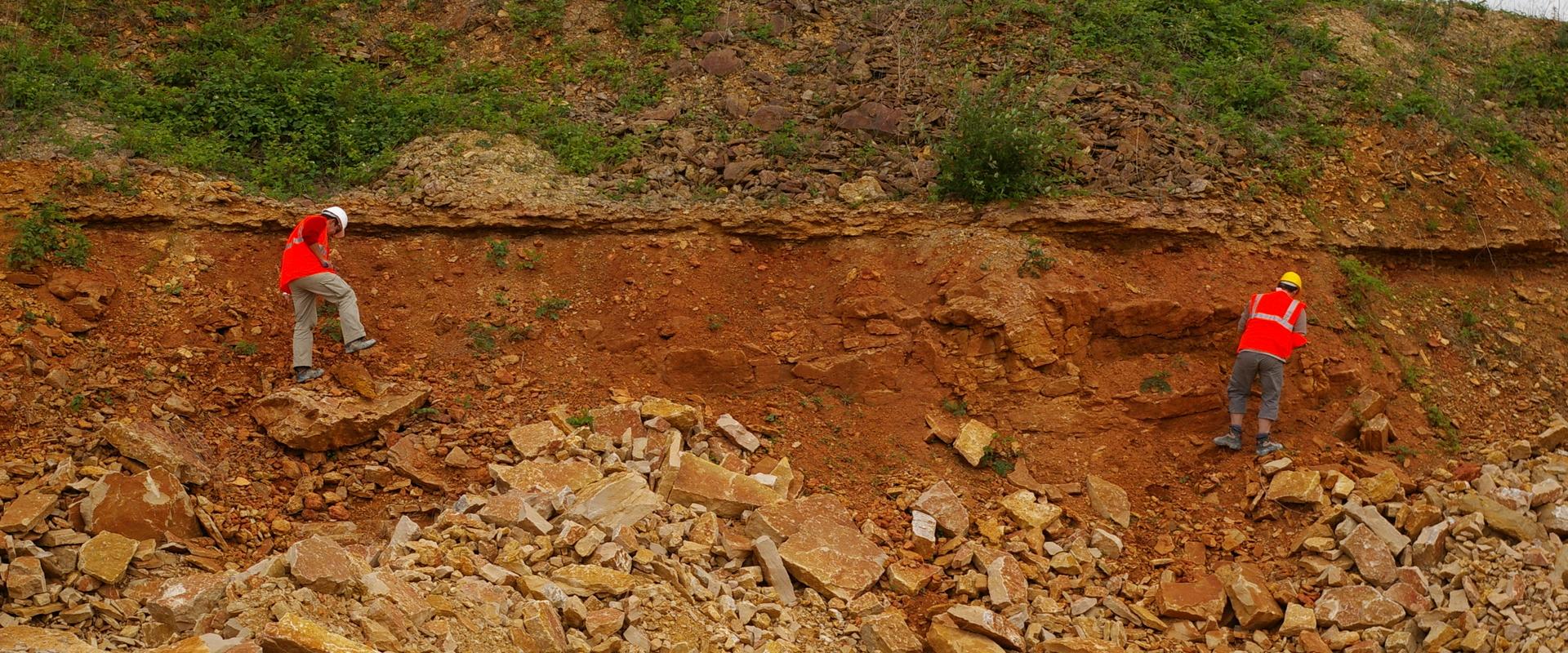The geologist's profession
Transcription
THE PROFESSION OF GEOLOGIST
GEOLOGY AND GEOLOGIST
Geology is the science and study of the past, specifically of the Earth since it was formed. It is important for us to understand how this happened in order to try to anticipate what is going to happen. This was formed like that, this was transformed like this. So in a given situation, in an analogous way, we will experience such and such a thing. The qualities a geologist must have include being very observant, curious and as persistent as a detective who is absolutely determined to find the answer to a question. This combination of qualities is essential to be able to stick to and achieve the objectives that have been set at the start.
THE PROFESSION OF GEOLOGIST
TOOLS
The geologist uses a range of tools in his work. On one hand, tools that are used for field work, e.g. hammer, compass, camera, laptop or field notebook. If he needs to see deep inside a geological formation he will drill into it.
So he will have a range of drills for different depths. He will also have small core drills which will penetrate the ground to a depth of about thirty metres. The core drills are used to take field samples which are then analysed in the laboratory. Geophysical sensors are also used to ascertain their physical properties. We also have a wide range of sensors which the geophysicist can carry with him whether on foot, by car or plane and now even carried in satellites.
THE PROFESSION OF GEOLOGIST
INFORMATION MANAGEMENT
All the information collected whether from direct observation or observations linked to sensor data, for example, is archived in databases which are constantly updated. With one word, you can access data available in many databases all over the world held by people who have nothing to do with each other. For example, you could enter "Bajocian limestone" and access data sets related to the term "Bajocian limestone", from which you could incorporate many more new technologies than you could before.
THE PROFESSION OF GEOLOGIST
DISSEMINATION OF INFORMATION
We have aids which are very professional like geological maps which can be easily interpreted by those familiar with them. But we are increasingly trying to offer other aids like three-dimensional models which anyone can use. It is very important to be able to get in contact with the user and to be able to reach as many individuals as possible. Given that it is absolutely vital to educate the population, to give them information and an understanding of the system, it is essential too that we are able to explain our work at this level of simplicity.
THE PROFESSION OF GEOLOGIST
IN THE FUTURE...
The profession of geologist is a profession of the future for in the view of the challenge that society now faces, there will be an increasing need for geoscientists and society is rightly calling more and more on geological knowledge.
Geosciences serving humanity
Transcription
Geosciences in the Service of Humanity Geosciences & Geoscientists
One definition of geosciences could be Earth sciences in the service of humanity. Or science in service of the Earth.
The word "geoscientists" includes engineers and researchers from all branches of Earth sciences with extremely varied specialties. There are petrographers, mineralogists, cartographers, environmental engineers, petroleum geologists, etc. And each one works with different observation scales. Some do lab work such as mineral micro-characterisation with electron microscopes. Others work on plate tectonics on the continental scale through geological field mapping.
Natural Risk Management
Areas of Application
Geoscientists, engineers and researchers work on different phases, namely in the public realm. The main areas are related to natural risks. For example flooding or landslides. Another major area is groundwater. Issues related to quantity and quality, and the impact of pollution from human and industrial activity. There's the more traditional area of mineral resources. The search for metallic or non-metallic mineral raw material deposits. Other areas are growing fast in the current context, such as geothermal energy, renewable energies, and complementary sources of energy to petroleum. Geoscientists can also intervene in the elaboration of predictive models that simulate long-term changes in behaviour. For example, rising sea levels. Another area is the French National Geological Service, who make geologic maps of France. Lastly, the valorisation of data acquired in the past with information systems such as databases and Internet sites. In the private sector, geologists and geoscientists are usually engineers called applied geologists who work in the field of geotechnics or hydrogeology. The scale of study in this field tends to be parcels. We try to characterise the soil for construction purposes, for example buildings. This work is usually carried out by research consultancies.
Geosciences in the Service of Humanity
Social Issues
All geosciences are in the service of humanity, for they help find responses to future challenges. Today it is necessary to be open-minded in terms of societal issues. We could cite everything related to resource protection. Obviously water, but also the soil and subsoil, and the pollution and the impact of human activity on the soil and subsoil. It can also be anything related to climate change. Natural risk prevention and the impact of climate change on our daily life.
And lastly, "energy" i.e. the growing scarcity of energy raw materials such as oil.
Geosciences in the Service of Humanity
Natural Heritage Transmission
One important challenge is the transmission to future generations of the earth's treasures. We see this with the creation of regional natural parks, geological reserves and the geopark concept, where you learn things as you walk.
The idea is to make the general public aware of a number of geological items, while trying to transmit to future generations various elements of our common heritage. In this case, our geological heritage.







